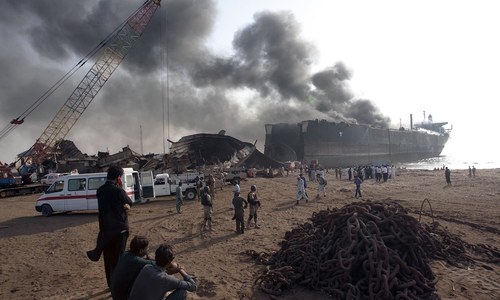GADANI: The thick black smoke rising from the vessel can still be seen from afar. As the ship-breaking yard in Gadani comes into focus, so do a large number of people still standing around to watch, brain-storming about what can be done to get out the bodies of the labourers who were trapped there. Now, a group of Edhi volunteers is the only one left working in the ship-breaking yard; the fire tenders left the compound a night ago. On these men’s shoulders now rests the entire burden of the rescue operation.
A massive explosion ripped through a ship standing at a compound at the ship-breaking yard on Nov 1 at 9.45am: one of the vessels brought in for dismantling had not entirely been emptied of oil. An officer from the Environmental Protection Agency (EPA), Mehboob Ali, explains that the workers use gas welders to carry out the dismantling. When these were used in the vessel containing oil, it quickly caught fire; the resulting explosion was heard as far as Winder. And the process of pulling out the bodies continues for the third day in a row. By Thursday night, 20 men were confirmed as having died, with Edhi volunteers saying that more are visible inside the vessel.
An extensive motorcade is parked outside the compound, as word has come that Balochistan Chief Minister Sanaullah Zehri might be visiting the site for ‘inspection’. Ministers and deputy commissioners in starched white shalwar kameez — the very same who had earlier ignored workers’ pleas that safety parameters at the yard be improved — mill about, looking for clues as to how the fire might have erupted.
At the site of the explosion, labourers who work at other ship-breaking yards are also trying to figure out how to rescue the bodies of their colleagues and friends. There is a strong reliance on Edhi volunteers, who despite their best efforts to get to the main part of the vessel and rescue the remaining bodies, said to be around 60 in number, are unequipped for the job.
At around 10:30am one of the volunteers, carrying a few white sheets and holding a keffiyeh to cover his mouth with, faints when he climbs on top of the ship. It takes another 15 minutes to get another volunteer to go up with a small bottle of water and bring him back down. Once back on the ground, the 25-year-old says: “The fumes at the top make it difficult to stand even for a few seconds. Also, it is almost impossible to walk as the surface is burning hot.” As he completes his sentence, another colleague asks him to not reveal anything to the press.
The director-general of the EPA, Tariq Zehri, evidently feels similarly. Speaking to reporters after conducting a brief inspection of the vessel, he says that it is “similar to the MV Tasman Spirit oil spill in July 2003 [in Karachi].” According to an EPA officer, who after the directions given by the EPA DG doesn’t want to be named, the ship weighs 25,000 tonnes and could carry 10,000 tonnes of furnace oil, diesel and petrol, of which an unknown amount was left. “So there’s a chance of further explosions if the rescue operation is not done properly, and in time,” he says.
No exact number is available right now regarding the labourers who work at the yard, says former labourer Abdul Ghaffar Khan, who is helping Edhi volunteers in the rescue operation. “In some ships between 150 and 250 labourers work in different parts of the vessel. For instance, there is someone who drills, others lift the scrap and those who get to the main hulk with gas welders. Since the office of the ship-breaking yard association is closed, there’s no way of finding out how many people were working here, as the documents are not available. It is not possible though for these people, who were asked to work here, to do so without being entered [in a register or work log]. The documents are here, even if the people whose job it is to provide them are on the run,” he continues.
The majority of the workers at the ship-breaking yard belong to Khyber Pakhtunkhwa and Punjab. “Labourers usually come from Swat,” Khan adds. “The work of drilling and gas welding goes to men from Punjab or gets distributed depending on who can do what.” Other labourers recount how children as young as 11 are asked to work at the ship-breaking yard because “either their parents owe the owners some money or because there is less workforce available.”
By evening, Chief Minister Zehri has arrived at the site, followed by federal Minister for Ports and Shipping Hasil Khan Bizenjo. Keeping their interaction with the press minimal and specific to the incident, both ministers assure of “proper action against the culprits”. In order to show resolve, the head of the Ship-Breaking Yard Association, Farooq Rizwan Diwan, is arrested on the spot by the police.
The president of the ship-breaking workers’ union and a member of the National Trade Union Federation, Bashir Mehmoodani, says that these [safety] issues were “known to many before the explosion occurred. These workers kept raising concerns about their rights and wanted their safety and security ensured at the yard, only to be ignored. It is only now that people are queuing up to speak up for them. It is shameful to say the least.”
Published in Dawn, November 4th, 2016














































